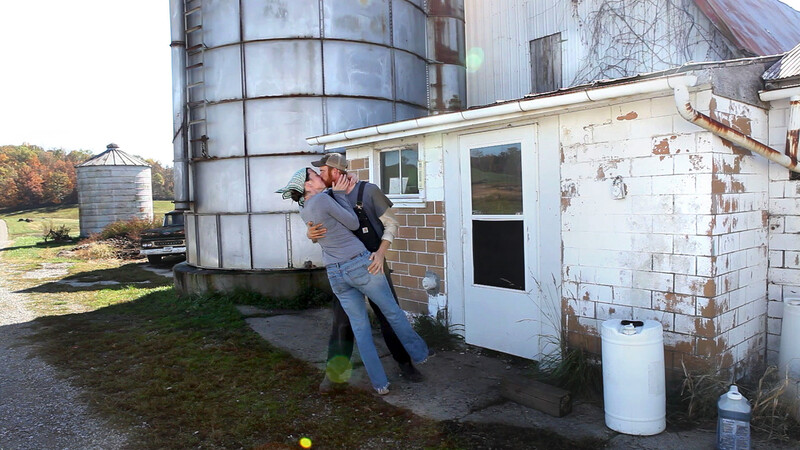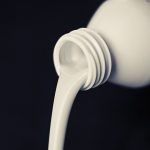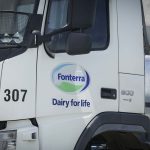
The documentary follows Celeste, her husband Nick and their young family as they fight to resurrect Nick’s grandfather’s dairy in southeast Ohio.
Nick, Celeste and Director Shaena Mallet joined Farm Journal recently for an interview on Overhe(a)rd, the Farm Journal Livestock podcast. Here’s a sneak peek of our discussion:
Q: Shaena, what was your vision behind the film?
Mallet: The root of it was really trying to connect people to one amazing family, to the Nolans. I wanted to share their experience that reflects so many small farms in the country and the system that certainly doesn’t play in favor of small family farms.
Q: Nick, I get a very strong sense from you that you feel this huge connection to your family’s dairy, and that’s a large part of who you are. Would you agree with that? And what does it mean to you?
Nick: Whenever you do something for so long it becomes the keystone of your identity. You don’t really know who you are if you’re not out there milking cows. You really don’t have a purpose or have a plan other than that you’re a steward of this land, and you’re trying to raise a family and you’re trying to grow food for people.
Q: You spend a fair amount of your time in the community and you make cheese you sell locally. How much do small dairies rely on their communities?
Celeste: We really rely entirely on our communities. I think the thing about small farmers in general [is] we’re all in a rural area and we’re looking for the populations of the urban centers to support our business. I mean, there’s lots of people who eat here, but it seems like to [get the] demand the prices that we need we need people with larger incomes—we need the urban centers and the urban populations to support our business.
Q: Celeste, what is it like now seeing that on film and reliving it in that that sort of intimate way publicly?
Celeste: It’s weird. Yeah, that’s what I told my friends, they can watch me yell at my kids and cry on national TV. But it’s realistic and I don’t know how it necessarily makes me feel. It’s definitely true to my life. And I guess the most shocking part about it is that we filmed it five or six years ago, but I’m pretty sure I cried like I did in the film on Thursday too.
Q: Nick, what’s your reaction watching the film now?
Nick: The thing that really strikes me is that we still have a lot of the same problems. We’ve moved on past some of them, but we’ve got new ones. It’s a daily struggle. And when I watch it, then that brings it all back into focus as to what we were dealing with as a family. It’s not like we’ve reached the point to where you can just coast and say, ‘Oh, well, we’ve got it all figured out now,’ because it’s just as chaotic. And it’s just as hard to go do this morning as it was then, right?
Q: Celeste, this is Nick’s grandfather’s dairy and he had a passion for it and grew up with this. Did you have any background in dairy?
Celeste: Not at all. I’d never been to a dairy farm until after we decided we were going to become dairy farmers. This was my first experience at a dairy farm. I was in my 20s before I ever made the connection that milk was from a cow, which is shocking to me, I guess.
Q: Nick, you’ve said dairy farming is a lifestyle, not a job. How would you describe it?
Nick: It’s a full-time commitment. You know, the jobs I used to have, you go to work and then after it was over with you come home at the end of the day and figure out what you want to do. This is what I want to, and that’s what keeps me committed to it every day. And I grew up milking cows and my grandfather, and my parents too, they never wanted me to get into dairy farming because of the economic side of it.
I mean, it was way in the 70s, too. It was boom and bust. You could go out there and have your best month ever milking. And if everyone else did too, the price dropped and you went down below what your cost of production. You had to start selling stuff to meet all your commitments financially. And when you had a good month, you started buying it all back. And there’s a lot of volatility to it and there’s no second shift to hand it off to. But I like to push myself and try and do the things that seem impossible or improbable, and this is right at the top of the list.
Hear the complete discussion, where the Nolans discuss their business model for surviving in a struggling economy and the making of the film Farmsteaders, on Overhe(a)rd: The Farm Journal Livestock podcast:
POV is American television’s longest-running independent documentary series, now in its 32nd season. Learn more about Farmsteaders at farmsteaders.com.

























